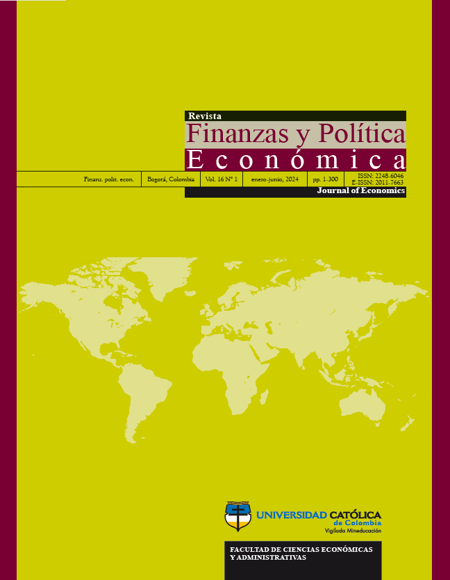
This work is licensed under a Creative Commons Attribution-NonCommercial-ShareAlike 4.0 International License.
This journal is licensed by a Creative Commons Attribution License (CC BY-NC-SA 4.0) Attribution-Non Commercial 4.0 International. For the CC licenses, the principle isthe creative freedom. This system complements the copyright without opposing it, conscious of its importance in our culture. The content of the articles is the responsibility of each author, and does not compromise in any way, to the journal or the university. It allows the transmission and reproduction of titles, abstracts and full content, with academic, scientific, cultural ends, provided acknowledgment of the respective source. This work cannot be used for commercial purposes.
They journal does not charge authors for submission or publication.
Abstract
To understand economic phenomena, traditional economic research has been based primarily on statistical analysis and mathematical and econometric models. However, the rapid advance of artificial intelligence in recent decades, hand in hand with the fourth Industrial Revolution driven by big-data, cloud computing, 3D printing, cybersecurity, the internet of things, Embedded systems, simulation, robots, augmented reality and, last but not least, Artificial Intelligence (AI), have created new possibilities and tools for researchers in topics related to economic sciences. The advance of AI is consolidated
rapidly in the different areas of the economic, social, environmental and even political life of human beings. In particular, in the field of research they are consolidated as advanced tools to develop research proposals, process large amounts of data, identify complex patterns and make more accurate predictions. These capabilities have allowed economists to approach economic problems from their vast complexity, in order to formulate more objective results and more precise proposals for their understanding and efficient, equitable and effective approach.

References
Chomsky, N. (2023). Chomsky on ChatGPT, Education, Russia and the unvaccinated. Edukitchen. https://youtu.be/IgxzcOugvEI?si=Z4Ptov4NLirJksDV
Cotton, D. R., Cotton, P. A., & Reuben, J. (2023). Chatting and cheating: Ensuring academic integrity in the era of ChatGPT. Innovations in Education and Teaching International. https://doi.org/10.1080/14703297.2023.2190148
Hill-Yardin, E. L., Hutchinson, M. R., Laycock, R., & Spencer, S. J. (2023). A Chat(GPT) about the future of scientific publishing, Brain, Behavior, and Immunity, 110. https://doi.org/10.1016/j.bbi.2023.02.022.
Korinek, A. (2023). ‘DP17923 Language Models and Cognitive Automation for Economic Research´, CEPR Discussion Paper 17923. CEPR Press. https://cepr.org/publications/dp17923
Kuan Lo, C. (2023). What is the impact of ChatGPT on education? A rapid review of the literature. Education Sciences, 13(4), 410. MDPI AG. http://dx.doi.org/10.3390/educsci13040410
Manohar, N., & Prasad, S. S. (2023). Use of ChatGPT in academic publishing: A rare case of seronegative systemic lupus erythematosus in a patient with HIV infection. Cureus, 15(2), e34616. https://doi.org/10.7759/cureus.34616
O’Connor, S. (2023). ChatGPT, Open artificial intelligence platforms in nursing education: Tools for academic progress or abuse? Nurse Education in Practice, 66, 103537. https://doi.org/10.1016/j.nepr.2022.103537.






























